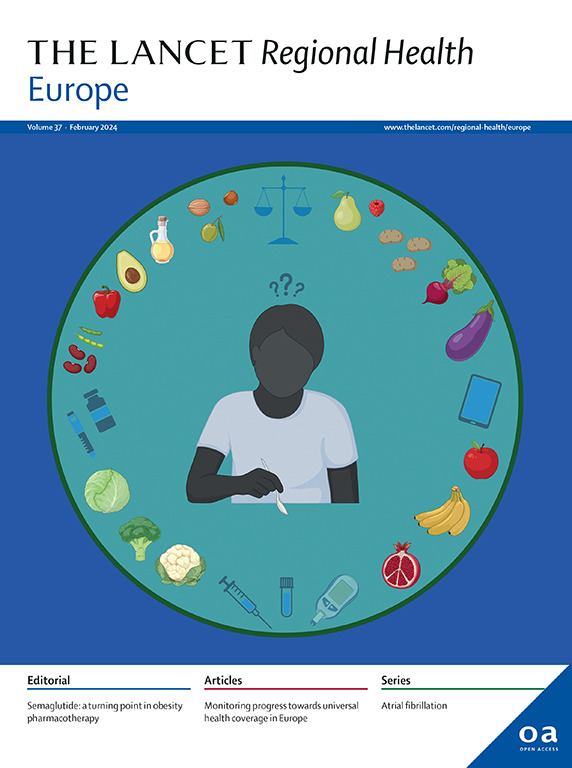Burden of bacterial antimicrobial resistance among hospitalised patients in Spain: findings from three nationwide prospective studies
IF 13.6
Q1 HEALTH CARE SCIENCES & SERVICES
引用次数: 0
Abstract
Background
Assessing the burden of antimicrobial resistance is essential to determine the magnitude of this problem and to set its priority. We aimed to estimate the burden of disease caused by multidrug-resistant microorganisms (MDRO) in hospitalised patients in Spain.
Methods
Three prospective nationwide studies were conducted in 2018, 2019 and 2023. All patients with a new diagnosis of infection with any of 10 selected MDROs plus Clostridioides difficile during the study period (one week in 2018 and 2019 and two weeks in 2023) were included. Patient demographic, and clinical outcomes were analysed, including incidence, crude all-cause 30-day mortality and years of life lost (YLL). These results were used to calculate weighted and seasonally adjusted annual estimates for the whole country.
Findings
In total, 82, 133 and 130 centres participated in the study in 2018, 2019 and 2023, respectively, recording a total of 907, 1392 and 2351 MDRO infections, representing a weighted incidence density of 3.54 (95% CI 2.92–4.17), 5.01 (3.95–6.07), and 4.41 (3.55–5.27) cases/1000 stays, respectively. A total of 161, 198 and 352 patients died with an MDRO infection, representing a weighted incidence density of 0.46 (0.16–0.76), 0.43 (0.17–0.69), and 0.62 (0.52–0.72) deaths/1000 stays, respectively. Based on these data, a nationwide occurrence of 155,294 MDRO infections (95% CI 127,928–182,569) with 20,065 deaths (6938–32,958) was estimated for 2018, 210,451 MDRO infections (165,963–254,975) with 17,982 deaths (7071–28,700) for 2019, and 173,653 MDRO infections (139,814–207258) with 24,582 deaths (20,461–28,796) for 2023.
Interpretation
The burden of disease caused by MDRO infections among hospitalised patients in Spain is very high and remains stable over the study period. National actions to combat bacterial resistance need to be intensified.
Funding
The management costs of this study were funded by the Spanish Society of Infectious Diseases and Clinical Microbiology (SEIMC). Researchers have participated voluntarily and none of the investigators received funding for conducting the study.
西班牙住院病人的细菌抗菌药耐药性负担:三项全国性前瞻性研究的结果
背景评估抗菌药耐药性的负担对于确定这一问题的严重程度和确定其优先次序至关重要。我们旨在估算西班牙住院患者中由耐多药微生物(MDRO)引起的疾病负担。纳入了所有在研究期间(2018 年和 2019 年为一周,2023 年为两周)新诊断感染 10 种选定 MDRO 中任何一种以及艰难梭菌的患者。对患者人口统计学和临床结果进行了分析,包括发病率、30 天全因粗死亡率和生命损失年数 (YLL)。研究结果在2018年、2019年和2023年,分别共有82、133和130个中心参与了研究,共记录了907、1392和2351例MDRO感染,加权发病密度分别为3.54(95% CI 2.92-4.17)、5.01(3.95-6.07)和4.41(3.55-5.27)例/1000人次。共有 161、198 和 352 名患者死于 MDRO 感染,加权发病密度分别为 0.46 (0.16-0.76)、0.43 (0.17-0.69) 和 0.62 (0.52-0.72) 次/1000 次住院。根据这些数据,估计 2018 年全国 MDRO 感染发生率为 155294 例(95% CI 为 127928-182569 例),死亡人数为 20065 例(6938-32958 例);2019 年为 210451 例 MDRO 感染(165963-254975 例),死亡人数为 17982 例(7071-28700 例);2023 年为 173653 例 MDRO 感染(139814-207258 例),死亡人数为 24582 例(20461-28796 例)。解读西班牙住院病人因MDRO感染造成的疾病负担非常高,并且在研究期间保持稳定。需要加强国家行动,消除细菌耐药性。资金来源本研究的管理费用由西班牙传染病和临床微生物学会(SEIMC)资助。研究人员自愿参与,没有人因开展研究而获得资助。
本文章由计算机程序翻译,如有差异,请以英文原文为准。
求助全文
约1分钟内获得全文
求助全文
来源期刊

Lancet Regional Health-Europe
Multiple-
CiteScore
19.90
自引率
1.40%
发文量
260
审稿时长
9 weeks
期刊介绍:
The Lancet Regional Health – Europe, a gold open access journal, is part of The Lancet's global effort to promote healthcare quality and accessibility worldwide. It focuses on advancing clinical practice and health policy in the European region to enhance health outcomes. The journal publishes high-quality original research advocating changes in clinical practice and health policy. It also includes reviews, commentaries, and opinion pieces on regional health topics, such as infection and disease prevention, healthy aging, and reducing health disparities.
 求助内容:
求助内容: 应助结果提醒方式:
应助结果提醒方式:


